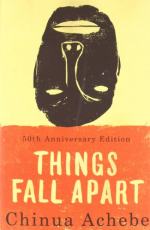|
This section contains 7,253 words (approx. 25 pages at 300 words per page) |

|
SOURCE: "Achebe's Sense of an Ending: History and Tragedy in Things Fall Apart," in Studies in the Novel, Vol. XXIX, No. 3, Fall, 1997, pp. 396-411.
In the following essay, Begam describe's three distinct conclusions to Things Fall Apart in relation to three different conceptions of history produced by reading the narrative in a post-colonial context, arguing that the novel offers various responses to tragedy as an art form as well.
One of the more notable consequences of cultural globalization has been the exchange that has occurred over the last decade or so between what we have come to call postmodernism and postcolonialism.1 This meeting of First World and Third World has inspired more controversy than consensus, but on one point there seems to have been wide agreement: if we want to understand colonialism, then we must understand how it is represented. As Hayden White has argued, speaking of historiography...
|
This section contains 7,253 words (approx. 25 pages at 300 words per page) |

|


